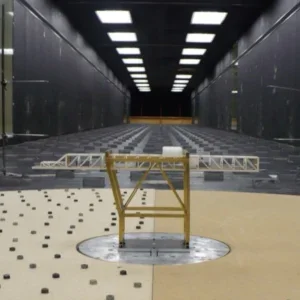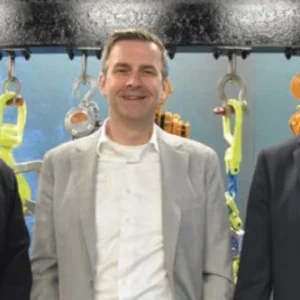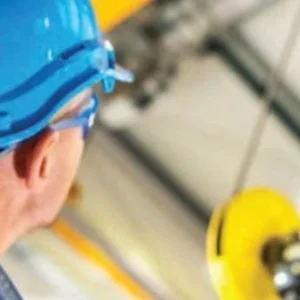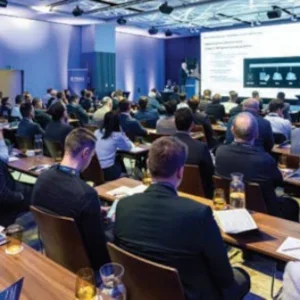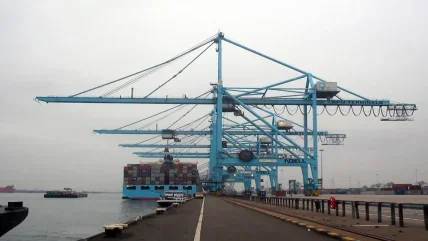
OCH: Molly, what drives you as an industry leader?
MW: My passion for manufacturing versus an analysis of existing systems. So, I really enjoy designing things that will be manufactured – considering how we're going to put it together and take it apart. Those are the type of things that drive me and continue to make this job interesting.
I’ve recently been working on a stacker crane that's ultimately going to be used in the navy and a 100t crane and runway structure for a concrete plant.
We don't do huge cranes like 200t. we're pretty much in the range of about 1.0t up to 100t as well as runway systems, a lot of single and double girder, lower capacity, cranes. Our plant has physical limitations on what we can build from a dimensional standpoint and our crane capacity is limited by our building capacity.
For the most part, we're working with military bases locally, defence contractors, power plants, paper mills, car manufacturers, pretty much anywhere there is manufacturing.
OCH: What is your biggest business inspiration?
MW: Walking into the shop and seeing the manufacturing factory and speaking to the welders, fitters and electricians. If they didn't come in to work, we wouldn’t have a job. They are a very important part of our industry. Even though I am white collar, I have a huge respect for all blue-collared workers. Their talent is to take sheets of paper and turn it into a working product. I can’t do that. That’s what drives me, making sure we are always putting product into the shop so that they have a job.
I can remember the lean years, between 2008–2010, when the bottom dropped out of the market and as soon as a project was approved, we tried to get it out as fast as we could so people could stay in those jobs. That really influenced how I look at things.
OCH: What is your business philosophy?
MW: To create the best product for your application. A turnkey solution that takes into consideration everything about your project. At Ace, we have a personal touch where a person is thinking about your problem and giving you a real-world solution to it. We’re going to take care of you.
OCH: Why and how did you enter this business?
MW: So that's kind of a fun story. I wanted to be a vet up until I was 16 and took chemistry at school, but then decided I hated chemistry and switched to physics.
Over the summer, before my senior year of high school I went to Germany to visit a foreign exchange student and her family who had lived with us previously. When I was there, my friend Anja wanted to throw me a surprise birthday party, and she wanted me out of the house to prepare everything.
So, her dad, who was a mechanical engineer, who worked for a company that built conveyor systems, took me to work with him. He was working on merging two packaging lines that had two different sized boxes to come together and kind of float together. He talked to me about his problems, he let me play with his CAD programme and I was hooked. I attribute him to getting me interested in engineering and, after that, those were the types of schools I started looking at.
My first job was working at a shipyard in Newport News, Virginia. I got engaged to my husband Ashley Wood and then eventually moved to Georgia, where he was based and found a job at Ace Industries.
I still keep in touch with the foreign exchange student Anja in Germany, she actually emailed me for my birthday a couple weeks ago, and I owe her a big newsy letter back. But we do keep in touch with pictures, and we have kids that are a similar age, so it's a lot of fun. Her dad is retired now.
OCH: Tell us about your success stories
MW: I'm really proud of my work with CMAA. I led the Mechanical Engineering Sub-Committee for about five years. The way it works is that there are five-year cycles between specification revisions and so I led the Mechanical Engineering Sub-Committee through a whole cycle of the mechanical section. It takes a lot of discussion because obviously the members are competitors, but we all have a passion for the industry and a passion for safety and making sure the designs are right and promoting the CMAA brand.
In the cycle where I was chairperson, we managed to update four or five sections and put in an entire new drum design section. So, we achieved some big things and the fact that we even got them passed and managed to come together and agree on these sections, is one of the things I am most proud of.
In terms of Ace, one of my most interesting projects was helping to design a pair of 10t wall walking jib cranes. There were many challenges about the project including how to build it in the shop in multiple sub-assemblies so that when it was installed it would hang at a 90° angle. Designing the installation was a big part of that project.
OCH: Tell us about your failures and how you overcame any challenges
MW: The project that I grew the most on was on a job that was going to Canada and had a lot of electrical design in the specification. When you have to take an ice road to deliver your cranes, there are some special requirements. It was early on in my career and I'm a mechanical engineer not an electrical engineer, so you kind of gloss over some of the electrical stuff when you read the spec. But in this case, I learned about mechanical and electrical limitations when a crane is going into sub-zero temperatures.
In this case, after we built it, we had to redesign and build all the electrical components a second time and then all the panels went from being one size to a bigger size. It was probably the first time where I learned that not everything is as straight forward as it seems and if you don’t know what something is in a specification then ask.
I’m involved in a lot of rebuilding and redesigning things to appreciate that. Things that you thought would be approved but then had to go back into the approval process again and having to track that design failure.
But when you find that something doesn't work, it teaches you to ask more questions up front, whether it's the customer or to yourself, as you're looking at the drawing package. It teaches you to trust your instincts.
I'm known for asking the same question in slightly different ways. I can't always put my finger on what's wrong, but there's something, and eventually, you find the answer. Sometimes it’s an ‘aha’ moment when we solve a problem. It's pretty much taught me to trust my gut a little bit more when talking to people.
OCH: What do you like about this business?
MW: I thoroughly enjoy the speed and pace of it.
When I worked at the shipyard in Newport News, everything I designed was going to be built three years after I left. But with cranes it’s six to eight weeks or, post-pandemic, 12–14 weeks and you're turning over product.
I like working on multiple jobs at the same time and there is customer interaction and I enjoy the fact we get to talk to every branch across the sector.
Ace Industries has over 30 branches and they're mostly service branches, but in the engineering department we get to talk to everyone – we get to have those personal connections with every branch and that's a lot of fun, especially when we come together for our annual meeting. We get to interact with a lot of different people.
OCH: What do you dislike about this business?
MW: Right now, delivery time. That's always the same answer, right? All industries are dealing with this, where you have problems getting deliveries across in the expected timeframe.
But I like manufacturing. If I had to be a consulting engineer where all you did was some calculations and write a report that's not me. I enjoy the project management side of things, knowing how things are going to flow and making sure the project's actually moving and you have considered everything. You follow the whole process from the design, to manufacturing and delivery and you're there as well to help with any support.
OCH: What makes your company unique?
MW: Ace Industries has a passion for people. We are a distributor, service provider and manufacturer. Manufacturing is actually a small part of what Ace Industries is about. Service is the largest aspect, and they have a passion for people and getting the job done right and taking care of the customer.
They are passionate in a way that they have a ‘servant heart’ and will go out of their way to make things right. We have branch managers who will personally deliver and drive a part over if needed, stay late until all the techs are home, and generate a culture of family. We have so many branches, we're able to borrow people so we send the right person for the job. We have depth and that is one of the things that makes Ace special.
OCH: What is your view on the future of the overhead cranes business?
MW: A lot of the changes we have seen have been electrical-based and to do with safety, with more fall protection on cranes. We are looking now at how we can utilise cranes to provide other aspects of safety and so I think we'll see more of that. I think we will continue to see the largest leaps in electrical and data collection. Companies are already starting to provide data about your crane on your smart phone or tablet. What’s next? Could a crane or hoist be powered through a signal eliminating the need to have wires completely?
When I first started in this business, we still had people who would ask for contactor controls and Center Drive Cranes, but dual drives are standard now and VFDs (variable frequency drives) are commonplace. I think we’re going to continue to see more features on hoists and cranes in a more compact space.
Company info
Ace Industries was founded by Harold Arwood in 1932 as an electrical motor shop in Atlanta, Georgia. During the 1970s and 1980s, Ace became a Master Dealer for Columbus McKinnon Corp., and started stocking products manufactured by CM, Coffing, Lift-Tech and Yale. At this time, the company began focusing on distributing material handling products and today it is one of the largest independent overhead crane and hoist distribution, manufacturing and service companies in the United States. Ace opened its first service manufacturing facility in 1983 and first service branch in 1996 and now supports over 100 hoist and crane brands and has 300 service sales, and operations associates. Through three generations of Arwood family ownership, the current CEO is Josh Arwood, who also served as President of the CMAA from 2019–2020, Cheryl Rossborough, CFO and Daniel Arwood COO. Its mission is to ‘Build Great Lifting Equipment, Foster Innovation that Improves our Industry and Provide a Place Where People are Valued and Can Grow’.
Molly Wood Profile
Molly Wood has worked for Ace Industries for 18 years, and is currently VP at CMAA, where she is next in line to take over as President of CMAA in 2025 from Daniel Beilfuss, GM, Columbus McKinnon Corporation’s (CMCO) Automation Division.
Her passion outside of Ace is her family. She has three children; two 13-year-old twins and an 11-year-old; two sons and a daughter. She is also heavily involved in the Boy Scouts of America (BSA), where she is a chairperson on the Scouts committee, handling all the logistics behind the scenes.
She is married to Ashley Wood, who she met when she was 18-years-old and they started dating romantically seven years later. They will be celebrating their 18th wedding anniversary this year.
Molly’s Top 5 tips for success
1. Be willing to listen to other's ideas.
Bouncing ideas off of a team can generate even better ideas. If you get so focused on your own, sometimes you’ll miss an opportunity. I like to summarise what I heard back to the other person. It allows them the opportunity to correct me or tweak their idea or offer more clarification and they feel heard.
2. Trust your gut.
A lot of times you have to trust your gut to move forward and ask for permission later. But as long as you're moving forward, and listening to others, you can’t agonise over every decision otherwise it would stagnate the process. When a customer calls, he doesn’t want to wait for 10 pages of calculations to know if you can do something. If it seems reasonable, provide the answer, that gives breathing room to do some calculation checks. If you find out you need to go back to them, you are armed with information and solutions.
3. If you don't have experience in something, go and talk to the guy who has to build it.
He may not have all the information on how to do the calculations, but he knows what needs to be done, and what the design limitations are. Once you have a concept, the evaluation work is easy.
4. Find a mentor.
Find somebody you respect in your industry, within your company or even in life. What do they do differently? How are they responsive? What draws you to them?
5. Positive vibe.
Be positive and put that out into the world. A positive outlook on a problem can often turn it into an opportunity and doesn’t tear down a team. Going through a trial together can strengthen team bonds. A friendly smile and eye contact can go a long way in setting the tone of a meeting or office conversation. There are opportunities in everything if you just look for them.


